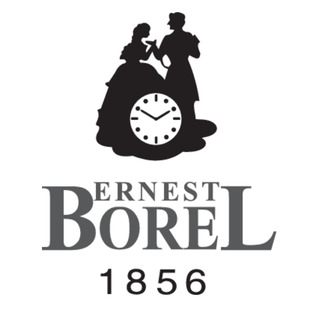
Horology is the study of the measurement of time. Clocks, watches, clockwork, sundials, hourglasses, clepsydras, timers, time recorders, marine chronometers, and atomic clocks are all examples of instruments used to measure time. In current usage, horology refers mainly to the study of mechanical time-keeping devices, while chronometry more broadly includes electronic devices that have largely supplanted mechanical clocks for the best accuracy and precision in time-keeping.

A watchmaker is an artisan who makes and repairs watches. Since a majority of watches are now factory-made, most modern watchmakers only repair watches. However, originally they were master craftsmen who built watches, including all their parts, by hand. Modern watchmakers, when required to repair older watches, for which replacement parts may not be available, must have fabrication skills, and can typically manufacture replacements for many of the parts found in a watch. The term clockmaker refers to an equivalent occupation specializing in clocks.

A clockmaker is an artisan who makes and/or repairs clocks. Since almost all clocks are now factory-made, most modern clockmakers only repair clocks. Modern clockmakers may be employed by jewellers, antique shops, and places devoted strictly to repairing clocks and watches. Clockmakers must be able to read blueprints and instructions for numerous types of clocks and time pieces that vary from antique clocks to modern time pieces in order to fix and make clocks or watches. The trade requires fine motor coordination as clockmakers must frequently work on devices with small gears and fine machinery.

Biel/Bienne is a town and a municipality in the Biel/Bienne administrative district in the canton of Bern in Switzerland.
Bulova is an American timepiece manufacturing company that was founded in 1875 and has been owned by Japanese multinational conglomerate Citizen Watch Co. since 2008. The company makes watches, clocks and accessories, and it is based in New York City.

The Contrôle officiel suisse des Chronomètres (COSC), the Official Swiss Chronometer Testing Institute, is the institute responsible for certifying the accuracy and precision of Swiss watches.

Vacheron Constantin SA is a Swiss luxury watch and clock manufacturer founded in 1755. Since 1996, it has been a subsidiary of the Swiss Richemont Group. Vacheron Constantin is the second oldest Swiss manufacturer and one of the oldest watch manufacturers in the world with an uninterrupted watchmaking history since its foundation in 1755. It employs around 1,200 people worldwide as of 2018, most of whom are based in the company's manufacturing plants in the Canton of Geneva and Vallée de Joux in Switzerland.

Oris SA is a Swiss luxury manufacturer of mechanical watches. The company was founded in 1904 and is based in Hölstein in the canton of Basel-Landschaft.

Saint-Imier is a municipality in the Jura bernois administrative district in the canton of Bern in Switzerland. It is located in the French-speaking Bernese Jura.

Audemars Piguet Holding SA is a Swiss manufacturer of luxury watches and clocks, headquartered in Le Brassus, Switzerland. The company was founded by Jules Louis Audemars and Edward Auguste Piguet in the Vallée de Joux in 1875, acquiring the name Audemars Piguet & Cie in 1881. The company has been family-owned since its founding.
WOSTEP, the Watchmakers of Switzerland Training and Educational Program, is an internationally recognized professional qualification in the maintenance and care of fine-quality watches. It was devised by the Centre Suisse de Formation et de Perfectionnement Horloger and is sponsored by manufacturers and retailers within the horological industry in Switzerland.
Adria and Adriatica are parent Swiss watch brands manufacturing for Eastern European markets.

Ernest Borel is a watch manufacturer founded in 1856 in Neuchatel, Switzerland. They have traditionally focused on export markets outside Europe and won several awards in the late 19th century, including first place in the 1866 Neuchatel observatory timing accuracy competition. This was viewed by the company as an important marketing strategy for increasing the brand's value, since the Neuchatel observatory was famed at the time for its timekeeping accuracy.

The Uhrencup is a club football tournament, held annually in Grenchen and Biel in Switzerland. The Uhrencup is seen as a testament to the major influence that is exercised by the local industry on the cultural lives of the area's residents. The tournament usually features four teams, each playing two matches, and is held in July as a friendly tournament, the format of which tends to be fluid. For the teams taking part, the tournament is a welcome opportunity to prepare for the upcoming football season.

Bovet Fleurier SA is a Swiss brand of luxury watchmakers chartered 1 May 1822 in London, UK by Édouard Bovet. It is most noted for its pocket watches manufactured for the Chinese market in the 19th century. Today it produces high-end artistic watches with a style that references its history. The company is known for its high-quality dials, engraving and its seven-day tourbillon. The original Bovet watches were also among the first to emphasize the beauty of their movements with skeletonized views and highly decorative movements. Bovet watches were also among the first to include a second hand while the company has a tradition of employing women artisans, which is rare for traditional watch making companies in Europe. Pascal Raffy is the current owner.
Léon Louis Gallet (1832–1899), watchmaker, entrepreneur, philanthropist, and past family patriarch of the Gallet Watch Company of Switzerland, is considered as one of the primary architects and founders of the 19th century industrialization of the Swiss watchmaking industry.
Mido SA is a Swiss watchmaking company founded in 1918. It is an entry-level brand of Swatch group.

Century Time Gems Ltd was founded on January 5, 1966, by Hans-Ulrich Klingenberg, the first day upon the abolition of the "Statut horloger", which had prohibited the entry of newcomers into the watch industry in Switzerland for almost 40 years.
The Gruen Watch Company was formerly one of the largest watch manufacturers in the United States. It was in business from about 1894 to 1958 and was based in Cincinnati, Ohio. It was founded in 1894 by German-born watchmaker Dietrich Grün, who changed the spelling of his name to "Gruen" because the letter ü does not exist in English.

Kintarō Hattori was a Japanese businessman and one of the first and most important Japanese watchmakers in history, as well as the founder of Seiko, one of the world's largest manufacturers of watches. He was a permanent council member of the Japanese Red Cross.














